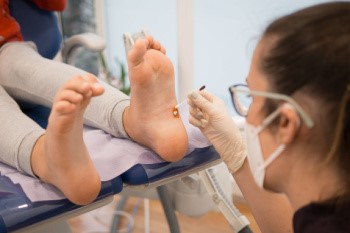A plantar fibroma is a knot in the arch of the foot. It can cause pain when repeated pressure is applied by walking barefoot or wearing tight shoes. While plantar fibromas can appear in anyone, men who are middle-aged or older are said to be more susceptible. The main symptom of a plantar fibroma is a firm lump on the arch of the foot. If there is pain, it can be intensified by putting pressure on the nodule. The lump can stay one size or grow larger. You may have one or more fibromas in the feet and there tends to be a high incidence of recurring plantar fibromas. Generally, a plantar fibroma can be treated without surgery. Treatment might include steroid injections to help shrink the lump, orthotics to help redistribute weight away from the nodule, plantar fascia stretching, or physical therapy to help use anti-inflammatory medication on the lump. If a lump grows larger or more painful, a podiatrist can be consulted to confirm the diagnosis. The doctor will palpate the lump and this may cause pain that can be felt all the way to the toes. An X-ray, MRI, or biopsy might be done if further evaluation is necessary. A lump in the arch of the foot might be something other than a plantar fibroma, such as cysts, nerve or fatty tumors, swollen tendons, or an infection in the foot. It is important to see a podiatrist for proper diagnosis and treatment of plantar fibromas.
 Plantar warts, also known as verrucas, can be painful and disruptive. These growths, caused by the human papillomavirus, or HPV, often appear as rough, grainy lesions on the weight-bearing areas of the foot, such as the ball and heel. Plantar warts develop when HPV infects the outer layer of skin on the foot, typically through cuts, cracks, or breaks in the skin. Certain factors, such as a weakened immune system or previous bouts of plantar warts, can increase susceptibility. Treatment options include prescription strength medications containing salicylic acid, cryotherapy, laser treatments, or surgical removal. Because it can be difficult to eradicate plantar warts on your own, a podiatrist can provide tailored treatment options to alleviate discomfort and minimize the risk of recurrence. If you have plantar warts, it is suggested that you schedule an appointment with a podiatrist for an exam and treatment options.
Plantar warts, also known as verrucas, can be painful and disruptive. These growths, caused by the human papillomavirus, or HPV, often appear as rough, grainy lesions on the weight-bearing areas of the foot, such as the ball and heel. Plantar warts develop when HPV infects the outer layer of skin on the foot, typically through cuts, cracks, or breaks in the skin. Certain factors, such as a weakened immune system or previous bouts of plantar warts, can increase susceptibility. Treatment options include prescription strength medications containing salicylic acid, cryotherapy, laser treatments, or surgical removal. Because it can be difficult to eradicate plantar warts on your own, a podiatrist can provide tailored treatment options to alleviate discomfort and minimize the risk of recurrence. If you have plantar warts, it is suggested that you schedule an appointment with a podiatrist for an exam and treatment options.
Plantar warts can be very uncomfortable. If you need your feet checked, contact Brent Harwood, DPM from Southeast Podiatry. Our doctor will assist you with all of your foot and ankle needs.
About Plantar Warts
Plantar warts are the result of HPV, or human papillomavirus, getting into open wounds on the feet. They are mostly found on the heels or balls of the feet.
While plantar warts are generally harmless, those experiencing excessive pain or those suffering from diabetes or a compromised immune system require immediate medical care. Plantar warts are easily diagnosed, usually through scraping off a bit of rough skin or by getting a biopsy.
Symptoms
Treatment
To help prevent developing plantar warts, avoid walking barefoot over abrasive surfaces that can cause cuts or wounds for HPV to get into. Avoiding direct contact with other warts, as well as not picking or rubbing existing warts, can help prevent the further spread of plantar warts. However, if you think you have developed plantar warts, speak to your podiatrist. He or she can diagnose the warts on your feet and recommend the appropriate treatment options.
If you have any questions please feel free to contact our offices located in Fairhope, Brewton, and Atmore, AL. We offer the newest diagnostic and treatment technologies for all your podiatric needs.
Plantar warts are growths that typically appear on the heels or other weight-bearing areas of the feet. These warts are caused by the human papillomavirus (HPV). The virus enters the body through breaks in the skin, such as cuts, that are on the bottom of the feet. Plantar warts are more likely to affect children and teenagers, people with weakened immune systems, people who have a history with plantar warts, and people who walk barefoot in environments exposed to a wart-causing virus.
If you suspect you have plantar warts, you may have the following symptoms: pain or tenderness while walking, a lesion that interrupts the ridges in the skin of your foot, small fleshy lesions on the bottom of the foot, or a callus where a wart has grown inward over a well-defined spot on the skin.
HPV causes plantar warts to form and is very common. There are more than 100 kinds of the virus in existence. However, only a few of them cause warts on the feet. The other types of HPV are likely to cause warts on other parts of the body.
If you have plantar warts, your podiatrist may try different treatment methods depending on your specific case. Some treatments for plantar warts are peeling medicines (salicylic acid), freezing medicines (cryotherapy), or surgical procedures. Laser treatments and vaccines are also used to treat plantar warts.